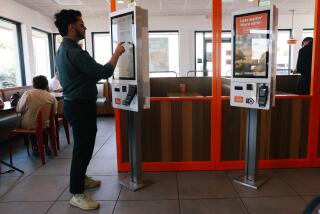Do You Copy?
- Share via
On a recent Thursday afternoon, Paul Diskin, manager of O’Brien’s Irish Pub in Santa Monica, was busily officing at the Kinko’s on Lincoln Boulevard in Marina del Rey.
Kinko’s, as everybody knows by now, is much more than the world’s biggest chain of 24-hour copy shops. It’s “the new way to office.” Diskin, standing before a large-format photocopier, was officing hard to create a new poster that would advertise the live bands coming up at the lively Main Street bar.
The machine kicked out a medium-sized poster. It looked pretty nice. Diskin hit the button for another copy. The copier shuddered, blinked a few amber-colored indicator lights and jammed. “Uh-oh, I just broke the machine,” Diskin said, and looked around. “Help.”
A Kinko’s employee arrived presently, opened the copier’s side panel, reached in and jiggled an interior carriage, restoring the machine to life. Diskin printed another poster, which came out even better than the first. Then the machine jammed again.
Hey, no one ever said the new way to office would be easy.
Roughly translated, the clunky but catchy Kinko’s phrase seems to mean about the same thing as work. But what the extremely successful chain of copying and service shops provides, obviously, is not work--though a lot of Kinko’s employees do a lot of work--but access to the machines people use when they work.
That includes, of course, the photocopiers, including impressive new color copiers, personal computers of both the Windows and Macintosh varieties, lots of software, laser printers, scanners to convert hard copy into computer-readable data, fax machines and even soda and candy machines.
In short, all the electro-mechanical wonders that are typically associated with today’s business office.
Though Kinko’s still makes most of its money from large-volume document reproduction, the Ventura-based firm has correctly and very profitably realized that the modern professional can’t work without machines, and if they can’t afford to own them, then they’ll just have to rent them, even if just for a few minutes at a time.
It’s another one of the simple but powerful insights of Paul Orfalea, founder and chairman of Kinko’s. According to company legend, Orfalea opened his first copy shop in 1970 in a converted hamburger stand near the UC Santa Barbara campus, after realizing that just about everybody needed copies at one time or another. Through most of the next 20 years, Kinko’s stores popped up primarily in college towns, but in 1989 the company started focusing more on corporate and small office/home office (SOHO) customers.
It’s been a happy strategy: Now there are 850 Kinko’s, mostly in the United States, with about 20 in other countries. Earlier this year, the investment firm Clayton, Dubilier & Rice Inc. further invigorated Kinko’s with a $214-million equity stake that will help fuel even more worldwide expansion and services, especially for the SOHO market.
In Kinko’s terms, the nation’s ongoing shift to SOHO-based employment translates to a large and growing demand for a convenient and dependable place to find a photocopier, personal computer, fax machine or just a clean, well-lighted place to work, said Karen Sophiea, the company’s vice president of marketing.
Sophiea is the person at Kinko’s headquarters who receives the letters from the English teachers and other defenders of grammar. They condemn the company’s “new way to office” slogan, calling it an incorrect usage of the noun “office,” and complaining that the marketing theme is another instance of advertising copywriters playing loose with the language.
That may be true, but in Kinko’s defense it should be noted that no less an authority than the New Shorter Oxford English Dictionary observes that “office” has been used as an intransitive verb in the United States since late in the last century.
Despite that, if you approach someone at Kinko’s and ask, “What are you officing on?” or maybe the jocular, “Officing hard or hardly officing?” you’ll be met with a blank, slightly frightened look. Even so, the steady stream of busy customers in the Marina del Rey store suggested that Kinko’s speaks the language of business very eloquently, and that is indeed helping people meet the day’s technological needs.
For example, there was the young man, casually well-dressed in a green shirt, tan jeans and cowboy boots, who was pacing, waiting impatiently for a fax that he thought should have arrived by then. He said his name was Rene. “Believe me, if I had the money I’d get my own fax machine,” said Rene.
“What do you do?” the young man is asked.
“I’m a physician, a surgeon.”
“And you can’t afford a fax machine?”
“I have a fax machine at home, but I’d need a fax machine every place I stay.”
“Where are you staying now?”
“On my boat.” He described the vessel as a 30-foot cabin cruiser.
Meanwhile, Diskin, the publican from Santa Monica, left with several posters under his arm. On his way out, he paused to recommend a few single-malt scotches.
The second floor of the Kinko’s is the core of the new way to office: it’s where the computers-for-rent are located. For as little as $10 an hour, you can use a Windows-based PC or a Macintosh running any number of software packages, including desktop publishers and word processors. Often, there’s a wait to use the machines.
There are several Kinko’s employees milling around, ready to answer computer questions and solve problems. They’re frequently thrust into the role of teacher, introducing people to personal computer technology for the first time, said Alana Ross, computer services manager at the Marina del Rey store.
Michael Smollins sat before one of the PCs, writing a business letter. The Culver City resident works out of his home, distributing a nutritional aid called Pyruvate+, which he said is a fantastic product becoming popular nationwide for its ability to both burn fat and promote growth and endurance of lean muscle, as well as increase overall energy levels. “You should try it,” he said. “You’ll get buff.”
Downstairs, at a spacious modular desk where there’s a free telephone for the convenience of customers, sat Steve Paul, crisp in a white shirt and pinstriped suit, hunched over a chart. Paul, a sales representative for a company that makes interventional angioplasty equipment, said he has driven more than 20,000 miles up and down California during the last six months--typical for him.
He stops at one Kinko’s or another probably three times a week between customer visits to fax, phone and handle paperwork. It’s his office on the road.
“To me, Kinko’s is sort of like McDonald’s,” Paul said. “Maybe it’s not quite as good as having all this stuff in your own office, but you know exactly what you’re getting when you walk into a Kinko’s, no matter where you are. They have built great brand recognition.”
Later, a woman came downstairs to the soft drink and candy machines. She said she is an actress and that she’d been upstairs working at a computer, updating her resume. It’s something she has to do frequently.
While waiting for the resume to print, she’d run down for a soda, but once again the real-life difficulties of officing in the technology era rose up. “Damn,” said the actress. “Machine just ate my dollar.” No beverages came out. She futilely flapped the coin return lever one last time, went back upstairs to retrieve her freshly printed resume, and then left the store, ready to search for her next job.
*
Freelance writer Paul Karon can be reached via e-mail at pkaron@pacbell.net
More to Read
Inside the business of entertainment
The Wide Shot brings you news, analysis and insights on everything from streaming wars to production — and what it all means for the future.
You may occasionally receive promotional content from the Los Angeles Times.










